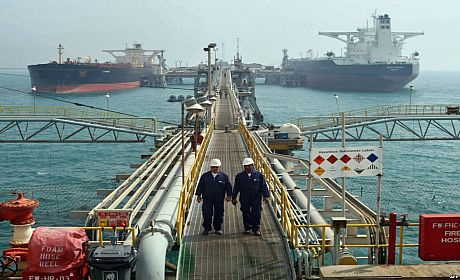Russia Retaliates with Iran’s Oil Card

The exchange of oil for food and goods was the last offer which was taken into consideration by Tehran and Moscow before the Geneva Agreement; a contract valued at 20 million dollars reports of which have not yet been confirmed or denied by Iran and Russia. What is the significance of this contract, leading the US to react?
No opinion can be made about a contract which has not been signed and whose details are unknown. But the US attempts to maintain the sanctions against Iran so that it can gain more concessions from Iran behind the negotiating table. Iran, on the other hand, attempts to weaken the sanctions so that it would have more power in negotiations.
During the past years, there were sanctions on Iran’s oil and it was generally exported to East Asian countries. What is the significance of Iran’s oil exports to Russia?
You should consider that Russia does not demand Iran’s oil. Russia itself is a major oil exporter.
Then why have there been these talks about the signing of an agreement?
I cannot answer why these statements have been made but it can only be said that Russia exports oil and does not need Iran’s oil for its own consumption. In general, any contract which is made between Iran and another country wherein goods are exchanged for oil, whether from India, China, Japan, Europe or the US, would not benefit Iran because you do not have the right to choose from the global market. When money is exchanged for the sale of oil, then you can purchase whatever you want, but when they give goods, you should receive the goods with the price that they set. In general, barter deals are not economically beneficial for Iran in the long run. Of course, perhaps they are good measures politically. Recently, we were faced with a reduction in oil exports. Some consider this measure as Russia’s strategic cooperation with Iran to increase its oil exports and also provide Iran’s domestic needs under conditions of financial sanctions.
On one hand, Russia has agreed with the sanctions that have been imposed by the UN against Iran and it takes part in the negotiations between the P5+1 with Iran, and, on the other hand, it weakens the sanctions with this contract. I do not know what role Russia really plays and what its intentions are. What is obvious is that Russia takes steps according to its national interests as any wise player would do.
One Foreign Ministry source has stated that this oil contract could be a very good measure which could affect Iran and Russia’s economic relations. What would the energy trade consequences since these two countries are both exporters of oil?
As you said, Iran’s objective behind this measure is to take some of its oil out of the circle of sanctions and sell it and in exchange receive some goods, whether directly or indirectly. There will be no regional consequences but it would have certain consequences which are important for the P5+1 and they might disrupt the trend of negotiations.
Saudi Arabia is one of Iran’s rivals and it might react to this agreement and the increase of Iran’s oil exports.
Iran will increase its oil exports to a market in which Saudi Arabia is not present. In any case, your statement is somehow correct because Russia does not demand Iran’s oil. It will sell this oil to the same markets. Based on the sanctions, Iran has lost its market in Spain, Italy and Greece and perhaps Russia intends to sell its oil to these markets and consume our oil for its domestic use.
But Russia’s oil may not be suitable for the refineries in these countries because it is lighter.
Yes, perhaps Russia’s oil is not suitable for their refineries and cannot be used. This issue has technical, political and economic aspects; it is not an easy task and I assume that no mechanism has yet been designed for this matter.
Certain experts claim that the center of the world’s oil is moving from the Middle East to the western hemisphere or, more accurately, to North America and only Iraq in the Middle East. Now what could Iran do to remain in the power balance of energy in the world?
Iran must either interact with the world and open its gates to the best companies of the world and develop its reserves, or continue the same path as before where it could not develop its reserves based on its real status. If we fail to import the best and most investments and technologies, we will be faced with a problem in the long run where other countries of the region would advance in the production of oil and wealth.
Will the signing of this agreement impact the global price of oil?
If this measure is not faced with serious competition from other similar oil producers, then it would have no impact.
What are Russia’s benefits in signing this agreement? Is this measure taken because Russia might be faced with energy sanctions due to the developments in Ukraine?
Russia is the biggest gas producer of the world and one of the biggest oil exporters in the world and the benefit of this agreement for Russia is not that it might be faced with energy sanctions.

